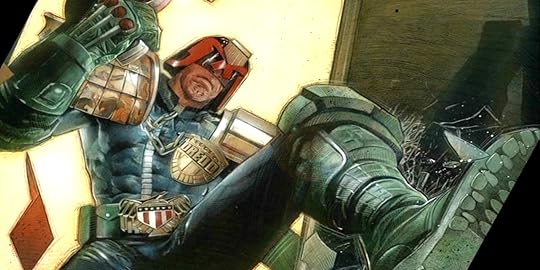Getting Thrown Out of Prison: Judge Dredd, the Oppressed, and Salvation

Judge Dredd is a law enforcement officer working in a dystopian future ravaged by radioactive waste. As a Judge in Mega City One he has the authority to arrest, sentence, and execute criminals at the scene of a crime. The judgments are harsh, immediate, binding and given without considering the wider context.
At a superficial level this system would seem to express the most concrete form of judicial system imaginable. A Judge comes to the scene of the crime, assesses what has happened there and pronounces a sentence. This could then be contrasted with what we might call a system that abstracts from what is happening. Asking broader questions about the conditions that encouraged the person to commit the crime in the first place.
This description of abstract and concrete is however very different from the more philosophical understanding of these terms. From this perspective Dredd can be seen as the ultimate example of enacting an abstract system of justice. Instead of taking into consideration the complex network of concrete conditions that would be required to properly understand and deal with the crime, Dredd abstracts the act from its frame and treats it as a type of isolated monad.
For Dredd, a crime is a problem that must be punished rather than the solution to a problem that must be understood.
When crime is abstracted in this way we fundamentally fail to see how it is intricately connected to the society from which it arises. For instance, if there are lots of people with mental health issues in the prison system, then this signals that we live within a broader political context that is unable to adequately help those who suffer in this way.
It’s easy to engage in something like prison ministry when we see ourselves helping those in need. But this approach obscures the fact that those who are in prison actually have something much more valuable to offer us. For they are the ones who can expose a crisis within the society we support/participate in.
Within religious groups there is a tendency to apply abstraction to those who are incarcerated. In this way they are effectively inoculated against confronting the problems that exist within their world that actually create the conditions they are responding to.
One might be able to help prisoners by writing letters or sending gifts, but prisoners have the potential of offering something much more significant: a type of salvation for the system that holds them.
For if we look at the those within the prison system, get to know them and discover the context that contributed to their imprisonment, we can begin to glimpse how the system we participate in is corrupt, violent and full of darkness.
This is, of course, a disturbing activity to engage in. For, in doing so, we are no longer able to maintain the fantasy that we are a type of hero helping poor, unfortunate people. Rather we realize that we need to do this work in order to discover how poor and unfortunate we are, and how violent the structure we participate in is for some people.
Thankfully there are some people who see their prison work in precisely this way. But the ones I know cannot be named, for if they were, they would be banned from reentering the prison system. There activity is allowed only when it is viewed as giving alms to the evil. If it is seen as exposing the injustice of the wider system they get throwing out of prison.
This is because the prison system is fundamentally designed to help us avoid confronting this reality. We much prefer to think of the prison system as protecting us from evil, rather than as protecting us from facing the disavowed evil (racism, economic injustice, lack of education, unemployment, underemployment etc.) that we dance with daily.
This same logic can be perceived in the way that religious organizations often view the homeless. Congregants are invited to get involved with homeless ministry to give something back, to offer people a hand up or to bring some good news. What we see then is nothing but an abstraction that makes us feel good, while protecting ourselves from the danger that we might be provoked to fundamentally change how we live by seeing ourselves as part of the reason why there are homeless people in the first place.
From a societal point of view, homelessness is not a simple problem; it is an obscene solution to a problem. For instance, in a place where there are lots of people on the streets who are suffering from being in the military, this makes manifest a crisis within that system. The solution then arises in the creation and management of those people on the streets.
A large homeless population signals the concrete manifestation of a failure within the system it arises within, exposing a crisis within that world. In this way, the homeless become the potential instrument of our fundamental transformation. We might be able to offer them some food and warm clothes, but they hold out the possibility of our salvation. When a state is forced to face the concrete issue of homelessness or crime (rather than treat them abstractly as divorced from the material conditions that create them), it has two options. Either it has to show that it doesn’t care – thus exposing it’s heart – or it has to work to make real political change.
So then, when we attempt to reach out to those who are persecuted, ignored and rejected by society, we should do so not because we have some good news to give, but because we will find there a good news to receive.
Peter Rollins's Blog
- Peter Rollins's profile
- 314 followers



